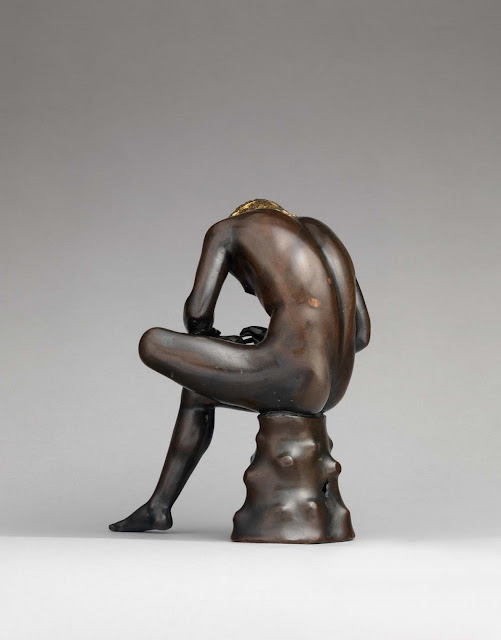 |
| Antico Bust of Bacchus ca. 1520-22 bronze Kunsthistorisches Museum, Vienna |
 |
| Antico Bust of Ariadne ca. 1520-22 bronze Kunsthistorisches Museum, Vienna |
 |
| Antico Apollo Belvedere ca. 1490 bronze Liebighaus, Frankfurt |
 |
| Antico Venus Felix ca. 1510 bronze Kunsthistorisches Museum, Vienna |
 |
| Antico Hercules and the Ceyrneian Hind ca. 1496 bronze medal Kunsthistorisches Museum, Vienna |
"The sculptor Pier Jacopo Alari de Bonacolsi (ca. 1455-1528) acquired the nickname Antico (the antique one) for his knowledge of ancient art. Born in or near Mantua, he probably trained as a goldsmith. In his youth Antico traveled to Rome, where masterpieces of the distant past were coming to light in excavations. The Renaissance passion for antiquity fostered the collecting of classical Greek and Roman art. Antico satisfied this demand by pioneering new genres of sculpture: exquisite bronze statuettes that were reductions of monumental ancient marble statuary, and life-size busts in the classical style. Antico's oeuvre, which includes medals and relief, as well as busts and statuettes, is remarkable for its fidelity to the spirit of the classical past, as well as for its innovative departures from it. His small-scale bronzes restore heads and limbs to figures whose monumental ancient prototypes had lost them and feature embellishments such as rich, black patinas, gilding, and silvering. Antico endowed his works with a precious jewel-like quality suited to the sophisticated tastes of his patrons. Antico spent his career as court sculptor to members of the Gonzaga family, princely rulers of Mantua, who promoted a culture of splendor to enhance their prestige. The artist's opulent bronzes found great favor with the Gonzagas, who displayed them alongside ancient works in their collections. Today, Antico's sculptures are recognized for their role in establishing a canon of classical art and for their technical refinement, which conceals the sculptor's labors behind seamlessly graceful forms."
– from curator's notes to Antico: The Golden Age of Renaissance Bronzes, an exhibition mounted in 2011 at the National Gallery of Art in Washington DC and in 2012 at the Frick Collection in New York
 |
| Antico Pan ca. 1519 bronze Kunsthistorisches Museum, Vienna |
 |
| Antico Mercury ca. 1520 bronze Kunsthistorisches Museum, Vienna |
 |
| Antico Atropos ca. 1519 bronze Kunsthistorisches Museum, Vienna |
 |
| Antico Hercules and Antaeus ca. 1519 bronze Kunsthistorisches Museum, Vienna |
 |
| Antico Satyr ca. 1500-1525 bronze Metropolitan Museum of Art, New York |
 |
| Antico Satyr (detail) ca. 1500-1525 bronze Metropolitan Museum of Art, New York |
 |
| Antico Bust of a Young Man ca. 1520 bronze Getty Museum, Los Angeles |
 |
| Antico Paris with Golden Apple ca. 1500-1505 bronze Metropolitan Museum of Art, New York |
 |
| Antico The Spinario ca. 1496-1501 bronze Metropolitan Museum of Art, New York |
 |
| Antico The Spinario ca. 1496-1501 bronze Metropolitan Museum of Art, New York |